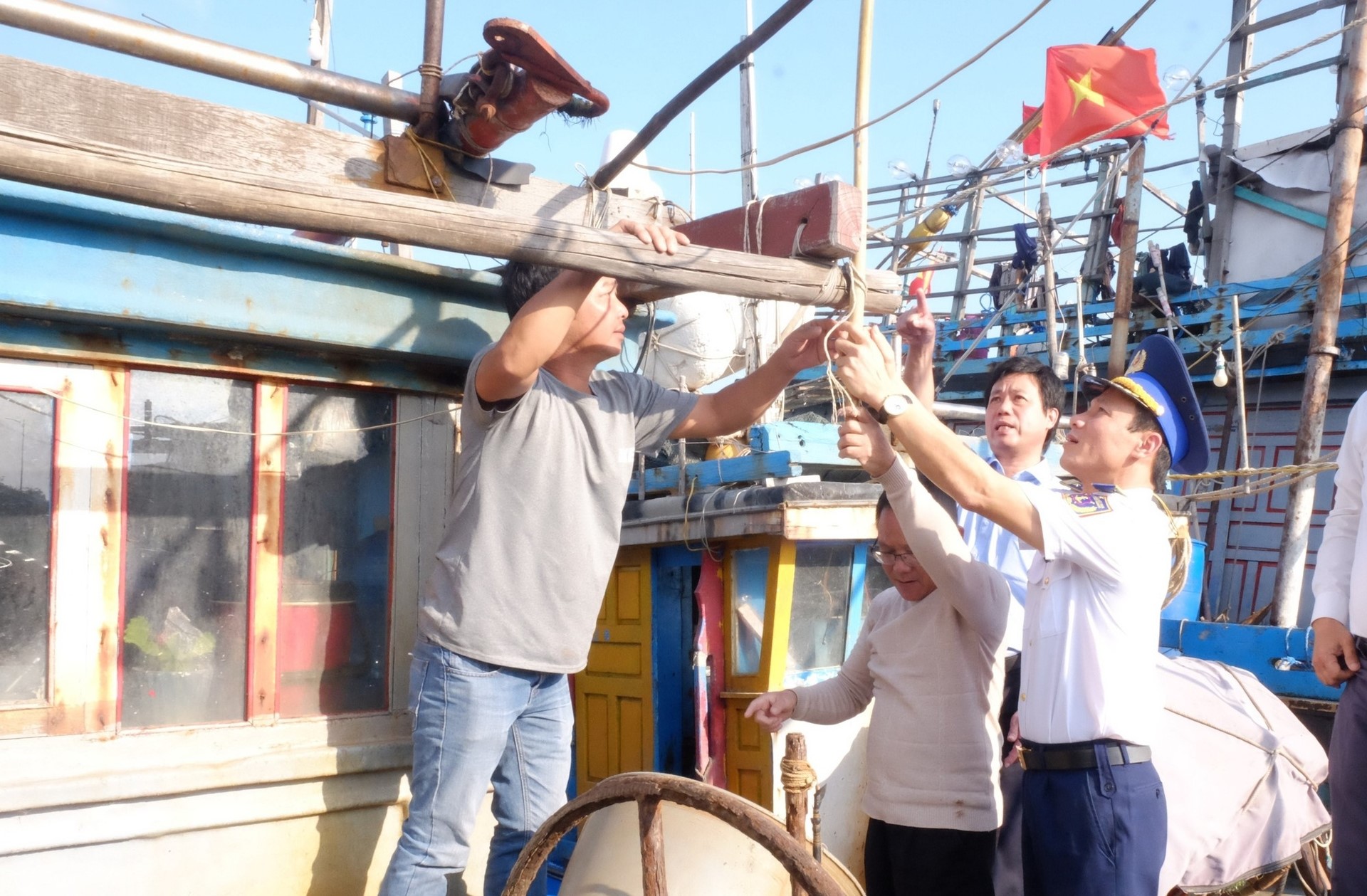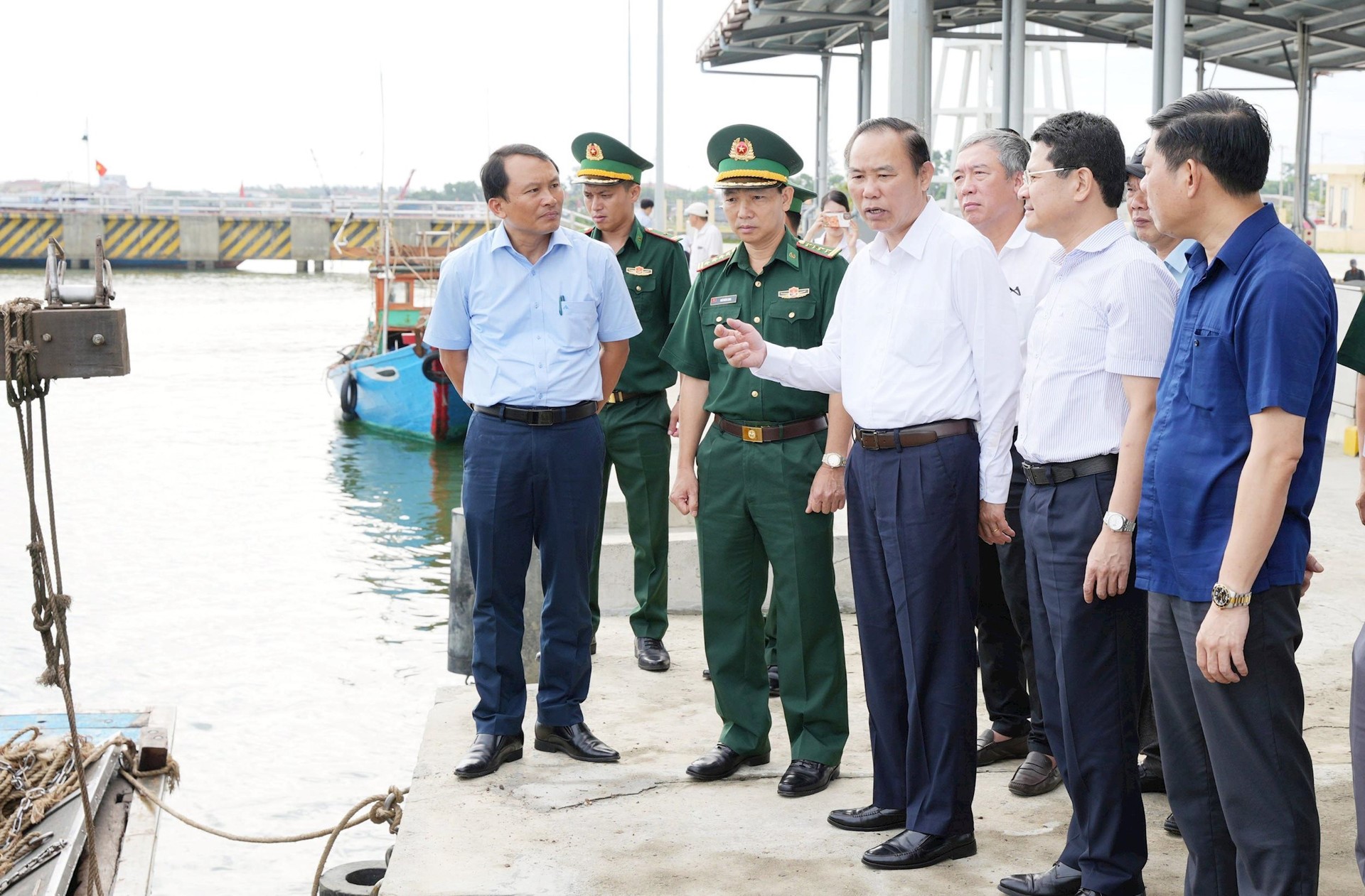June 21, 2025 | 02:55 GMT +7
June 21, 2025 | 02:55 GMT +7
Hotline: 0913.378.918
June 21, 2025 | 02:55 GMT +7
Hotline: 0913.378.918

Coast Guard forces disseminate the law to fishermen in Da Nang waters.
That is the content of the official dispatch the Ministry of Agriculture and Rural Development (MARD) has just sent to the People's Committees of Da Nang city and Thua Thien - Hue province on June 16 to prepare for the 4th working session with the Inspection Delegation of the European Commission (EC) in October 2023.
Accordingly, MARD requested the People's Committees of Da Nang and Thua Thien - Hue to strictly follow the Prime Minister's direction in Decision No. 81/QD-TTg dated February 13, 2023, Official Telegram No. 265/CD-TTg dated April 17, 2023, and the direction of the Head of the National Steering Committee on IUU fishing.
Specifically, MARD requested that the People's Committees of the two province and city regularly inspect, examine, and organize a review of the responsibilities of organizations and individuals that fail to fulfill their assigned responsibilities and tasks. The localities shall inspect the management of fishing vessels entering and leaving the port and the works of controlling fishing vessels entering and leaving the wharf at the border checkpoint, collecting and submitting fishing logs, monitoring the loading and unloading output through the port, and certifying aquatic raw materials exploited at the port. Inspection results should be reported to MARD by June 23, 2023.
In addition, the localities urgently consolidate and arrange the departments performing tasks at the fishing port and the fisheries inspection and control office at the port to ensure interconnection and synchronization in organizing and coordinating the implementation of the task of combating IUU fishing. At the same time, the localities also clarify responsibilities between functional forces, including fishing ports, sub-departments of fisheries, and border guards.
The MARD’s official dispatch emphasized that the People's Committees of the province and city ensure the work of managing fishing vessels in accordance with regulations, including procedures for registration, issuance of fishing licenses, and issuance of certificates of food safety and hygiene; installing VMS equipment; and fully updating fishing vessel data into the national fisheries database (VNFishbase).
Especially, the People's Committees of the province and city need to ensure 100% of fishing vessels dock at designated ports and supervise 100% of locally caught seafood output; strictly comply with the certification and traceability of caught seafood; closely inspect the certification work at the sub-departments of fisheries with exporting enterprises; and strictly handle organizations and individuals legalizing dossiers for export shipments.
In order to best serve the EC's inspection, MARD recommends that localities review, arrange, and store dossiers both on paper and on electronic software to ensure easy access and timely provision. Data is required to be consistent between local reports and on VNFishbase, as well as between agencies and functional units.
The supervision also includes controlling other provinces’ fishing vessels operating at the localities and inspecting and controlling 100% of fishing vessels entering and leaving the wharf at Border Guard posts or stations. This aims to ensure strict handling of fishing vessels that are not eligible to enter and leave fishing ports to load and unload caught seafood.
MARD also suggested that the People's Committees of Da Nang and Thua Thien - Hue prioritize allocating sufficient resources for local fisheries management agencies and relevant functional forces to carry out the task of combating IUU fishing. In addition, strengthen the organization of local fisheries surveillance in accordance with the Law on Fisheries and the Law on Organizing the Local Government.

Deputy Minister Phung Duc Tien has just inspected the situation in combating IUU fishing in Thua Thien-Hue.
In the official dispatch, MARD pointed out some shortcomings and limitations of the locality. Accordingly, the number of fishing vessels in Da Nang has not been consistent between the city's report and VNFishbase; 65% of fishing vessels have been issued fishing licenses, but the number of fishing vessels that lost VMS connections is relatively large (55 ships lost connection over six months, 23 ships lost connection over one year).
Da Nang’s implementation of controlling fishing vessels entering and leaving the port and entering and leaving the wharf through the border guard station did not meet the regulations, leading to many cases of fishing vessels from other cities and provinces violating IUU fishing and weak verification and handling results.
The seafood output of the whole city is not fully monitored and supervised. The output exploited according to the regulation only reaches about 40%. The fishing log’s quality has not met the requirements because it has not been checked and compared with VMS data, leading to insufficient reliability in traceability.
About 80% of fishing vessels from other provinces docked at Da Nang port, but this fishing output has not been able to be separated, so it is not possible to assess the proportion of local fishing vessels controlled to avoid IUU fishing violations.
As for Thua Thien-Hue, the province currently has about 250 unregistered fishing vessels; the number of fishing vessels that lost VMS connections is relatively large (average of 30–50%); and about 30% of fishing vessels have not been granted a certificate of eligibility for food safety and hygiene.
In particular, as for the logistics fleet catching aquatic resources, the province has not checked and compared it with VMS data, leading to insufficient reliability in traceability.
Translated by Huyen Vu Thu

(VAN) The waste of resources from agricultural by-products and the situation of counterfeit and poor quality goods in production causing losses of thousands of billions were pointed out by the National Assembly deputy.

(VAN) After 5 years of implementation, the CAI initiative has helped coffee growers change their farming practices, moving toward responsible agriculture that meets global export standards.

(VAN) The primary prerequisite for the comprehensive and robust integration of Vietnam's livestock sector into the global value chain is the establishment of a disease control system.

(VAN) The results of national programs are essential for establishing a contemporary livestock sector that is well-equipped to meet the demands of both domestic and international markets, with robust biosafety standards.

(VAN) The UNESCO Global Geopark revalidation of Non nuoc Cao Bang and the transition to a two-tier administrative model are presently undergoing a pivotal moment in Cao Bang, the northernmost province of Vietnam.
/2025/06/13/5330-2-004539_953.jpg)
(VAN) Changing policy mindset and removing investment barriers are urgent requirements to open up new development space for enterprises in the agricultural sector.

(VAN) The areas include the restoration of five million hectares of marine ecosystems.